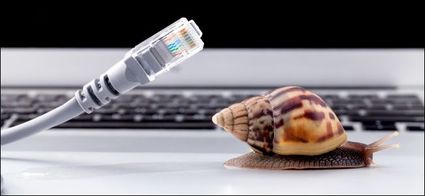Does Your Internet Seem Slow?
Top 3 Ways To Deal With A Slow Internet Connection
March 5, 2020
Nothing is more annoying than having slow internet. When it eventually happens to you – and it will, you're going to wonder what you can do to speed up your connection. I've listed three of my top tips below.
1. Check Your Internet Plan
Sometimes, your internet connection is slow because you're paying for cheap internet. Contact your internet provider and find out what plan you actually have.Also, run a speed test using speedtest.net to see how well your internet is actually performing. Be sure to stop any downloads, uploads, Netflix streaming, or other heavy internet activity before running the test to ensure as little interference with the results as possible.
Speed tests sometimes appear rather high, as some Internet service providers may prioritize them and may have servers very close to you. If your connection speed appears to be a bit slow, that can be normal as you generally pay for up to a certain speed and may not always get the exact speed that you pay for. Speeds may also be slower at busier times of the day, when everyone in your area is using the internet connection, rather than off peak hours when many people are sleeping.If what you've measured is close to what you're paying for, then your network is working fine and your internet plan just isn't very fast. The best way to speed it up will be to consider an upgrade.
2. Reboot Your Hardware
Computers, modems and routers sometimes get stuck in a bad, slow, overloaded state so that's why it's always a good idea to give your modem and router a quick reboot to see if that helps. If you have a combined modem/router unit, you may just have the one device to reboot. But there's a good chance you need to reboot two pieces of hardware; the router and the modem. The router connects to the modem which is connected to the cable coming out of the wall. To reboot them properly, I recommend that you unplug each from their respective power outlets for ten seconds before plugging them back in. It may take a few minutes for your modem to reconnect to your Internet service provider and bring your connection online, so be patient.
Check the other computers on your network to see if their internet is slow, too. If the problem only happens on one computer, the problem may be with that particular computer, not your router or modem.
3. Know Your Hardware's Limitations
If you're paying for a super-fast internet plan – i.e. a fiber connection that gets you a mighty 1Gbps (1,000Mbps) – you're never going to see those speeds if the primary WiFi router in your house is an antiquated wireless device. Even if you have a faster, newer router but you're connecting to it with an older or cheaper laptop, you're going to wonder why your transfer speeds are so slow. It could be possible that your internet is fine, but your WiFi – the wireless signal that connects you to the internet – could be having signal problems. A bad WiFi connection can seem like an internet connection problem, especially since it can affect all of the devices on your network. There are quite a few reasons you may have a bad WiFi signal. The airwaves could be congested with too many devices nearby, especially if you're using 2.4GHz and not 5GHz which can support a lot more devices. This is a particularly common problem in denser urban areas such as apartments with neighbors who have a bunch of wireless routers and other devices.
If you are upgrading your router, be sure to purchase a model with a lot of potential throughput which should generally give your speedier devices the best possible speeds.
Willie E. Brake is a Computer Expert and Industry Analyst at All About Technology, a Certified Minority Business Enterprise and Microsoft Authorized Refurbisher, based in Detroit, Michigan.




Reader Comments(0)